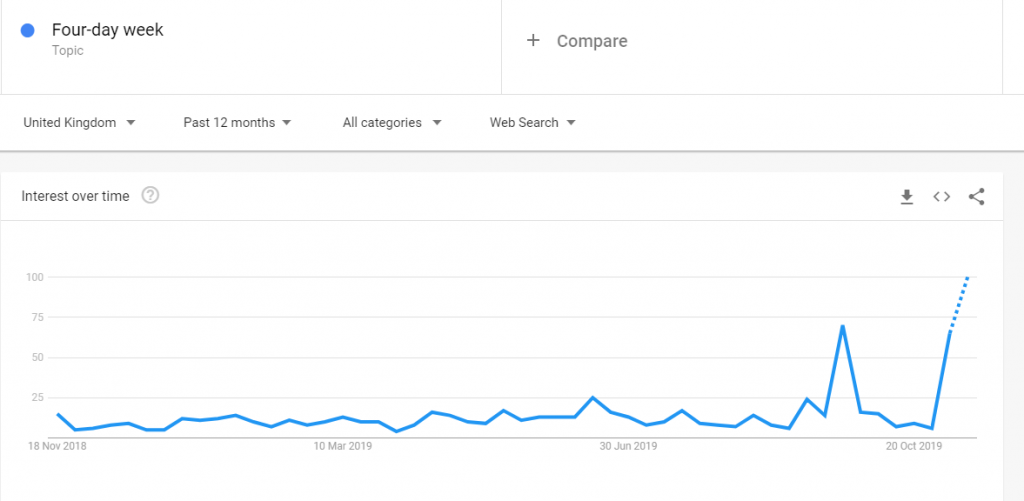Can the UK function on a four-day week?
The four-day week has been considered for some time, but has had a recent upsurge thanks to the Labour party adopting it as policy in time for the upcoming election on December 12th2019.
You can see the two peaks in Google Trends – one from the announcement in September at the party conference, and the next fuelled by Labour’s election publicity and the Conservative responses to it as a policy.

According to the BBC report, the Labour interpretation of this idea is to “reduce the average full-time working week to 32 hours within the next decade.”
This would not include a national cap, as is done in France, but instead would take the needs of different industries into account.
The aim of the four-day week is generally two-fold, to increase workers’ morale and loyalty, and also increasing their productivity. According to several surveys, British workers produce up to 16% less on average than their counterparts in the other leading economies.
Most recently, the Japanese branch of Microsoft trialed the idea, and found that it resulted in nearly a 40% rise in productivity.
“The number of pages printed decreased by 58.7%, while electricity consumption was down by 23.1% compared with August 2018.”
https://www.businessinsider.com/microsoft-4-day-work-week-boosts-productivity-2019-11?r=US&IR=T
The five-day, 37.5 – 40 hour working week might feel like a natural, obvious part of life for most industries, but it was only widely introduced in the twentieth century, and was a reduction from a Victorian standard of six days in a working week, with between 10 to 16 hours in a day!
Is it time for another reduction? Or is it doomed to failure?
TIME AND ATTENDANCE UK SYSTEM OFFERS EXTENSIVE OPTIONS FOR THE MANAGEMENT OF FLEXIBLE WORKING HOURS
Time and Attendance UK supplies an extensive range of workforce management solutions that cater for all the requirements of the modern workplace, including features which will help employers feel more confident about implementing a flexible working pattern.
The system can supply working rules for a variety of purposes, from simple determination of overtime by the number of daily hours worked, to the more complex payment of overtime hours adjusted when periodic targets are not met. The system also contains special rules to accommodate the formal flexitime contracts worked by many public sector employees. Workers paid on an annual contract basis can receive reports stating how many contracted hours they have yet to work.
Additionally, our top-range WinTA suite features an On-line Self Service module that allows staff to clock IN or OUT, check hours, request holiday leave + other functions via internet, mobile or other communications.
If you’d like to find out more about how we can help your company implement thorough and reliable flexible working arrangements, just contact us or Book a Demo.